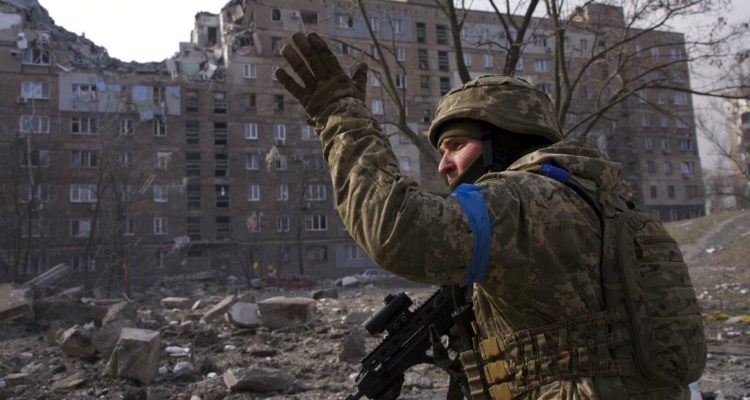The op-ed’s comparison between the Russian invasion of Ukraine and Israel’s conflicts with Hamas is completely ahistorical and intellectually lacking.
By Adam Levick, The Algemeiner
The fundamental premise of a Guardian op-ed by Moustafa Bayoumi (“Facebook’s solidarity with Ukraine is impressive. Now extend it to others,” March 19) is based on an inaccuracy:
“Last week, we learned that Meta — the parent company of Facebook and Instagram — has temporarily changed its rules and will allow certain posts calling for violence to remain on its platforms. Users of Facebook and Instagram who live in countries close to Ukraine will be permitted to post calls for violence against Russian soldiers and even for the deaths of the Russian president, Vladimir Putin, and his Belarusian counterpart, Alexander Lukashenko — though, without specifics of location or method, the company stipulated.
“As a result of the Russian invasion of Ukraine, we have temporarily made allowances for forms of political expression that would normally violate our rules, like violent speech such as ‘death to the Russian invaders’. We still won’t allow credible calls for violence against Russian civilians,” Meta said in a statement.
Bayoumi goes on to argue, in effect, that Meta — via its Facebook and Instagram platforms — doesn’t apply their rules evenly, which impacts Palestinians “resisting” Israel. But, as we explained to Guardian editors in a complaint last week, the claim in his opening paragraphs is based on erroneous information.
Bayoumi is basing his op-ed on reports from Reuters on March 11. However, after three days, the tech giant clarified that their new rules are not what was being reported — as The Guardian itself reported on March 14:
“Facebook and Instagram users are not allowed to call for the death of Vladimir Putin, according to an update issued by their parent company. Meta had issued new guidance on Friday allowing content that condoned the harm of Russian soldiers, with media reporting at the time that it also permitted content urging violence against the Russian president.
“Meta’s president of global affairs, Nick Clegg, has clarified the rules on posts, stating that ‘calls for the death of a head of state’ are banned. Clegg said in an internal post to staff on Sunday, first reported by Bloomberg, that the new moderation rule ‘is never to be interpreted as condoning violence against Russians in general’. He added: ‘We also do not permit calls to assassinate a head of state.’
“Clegg added in the internal post on Sunday that the revised policy allowing threats of violence against the Russian military only applied in Ukraine, and ‘only in the context of speech regarding the Russian military invasion of Ukraine.'”
The differences between Ukraine and Gaza
Bayoumi’s factual error compromises almost the entire piece. For example, he writes:
“With its latest move, however, Facebook is not only acknowledging that it plays an important role in directing global politics, but is also now taking a very public position against foreign military occupation.”
Again, this is not true. Meta’s policy says nothing about “occupations” of disputed territory. It merely allows Ukrainians in Ukraine to, for the duration of the war, use their platforms to call for resistance to Russia’s unprovoked military invasion of their country.
Later, he writes:
“Facebook’s announcement could and should help us make the connections between besieged and occupied people everywhere and increase the desire to fight for them equally, and we should and will now be expecting Facebook to do the same.”
Bayoumi is again mischaracterizing Meta’s policy, while also suggesting a moral equivalence between Russia’s invasion of Ukraine and Israeli conflicts with Hamas — a completely ahistorical and intellectually unserious comparison for several reasons:
* Terror groups in the Palestinian territories, including but not limited to Hamas in Gaza, launch terror attacks against Israeli civilians, with the ultimate goal being Israel’s annihilation. Ukraine doesn’t sponsor and launch terror attacks against Russia or seek the country’s destruction. Nor do they threaten its security in any way.
* Israeli military operations in Gaza are launched in response to rocket and other terror attacks against civilians by internationally proscribed terror groups. Russia’s invasion of Ukraine was completely unprovoked.
* Israel warns Palestinian civilians in combat zones to evacuate before carrying out strikes. Russia intentionally targets civilians without warning, both in this war and in previous ones. (In fact, targeting civilians is a tactic used by the Palestinian governments, but not the Israeli one).
* Israel took control of the disputed territories in 1967 as the result of a defensive war, subsequently withdrew from most of it (including all of the Sinai and Gaza), and offered, on several occasions, to cede most of the remaining land they control — offers rebuffed by Palestinians leaders. Russia’s war in Ukraine (as well as previous wars in Crimea and Georgia) have been wars of aggression based on Vladimir Putin’s belief that the internationally recognized Ukrainian state has no right to exist.
We contacted The Guardian asking that the op-ed be corrected in light of the egregious factual error about Meta’s policy contained in the opening paragraphs.
Adam Levick serves co-editor of CAMERA UK — an affiliate of the Committee for Accuracy in Middle East Reporting and Analysis (CAMERA), where a version of this article was first published.





